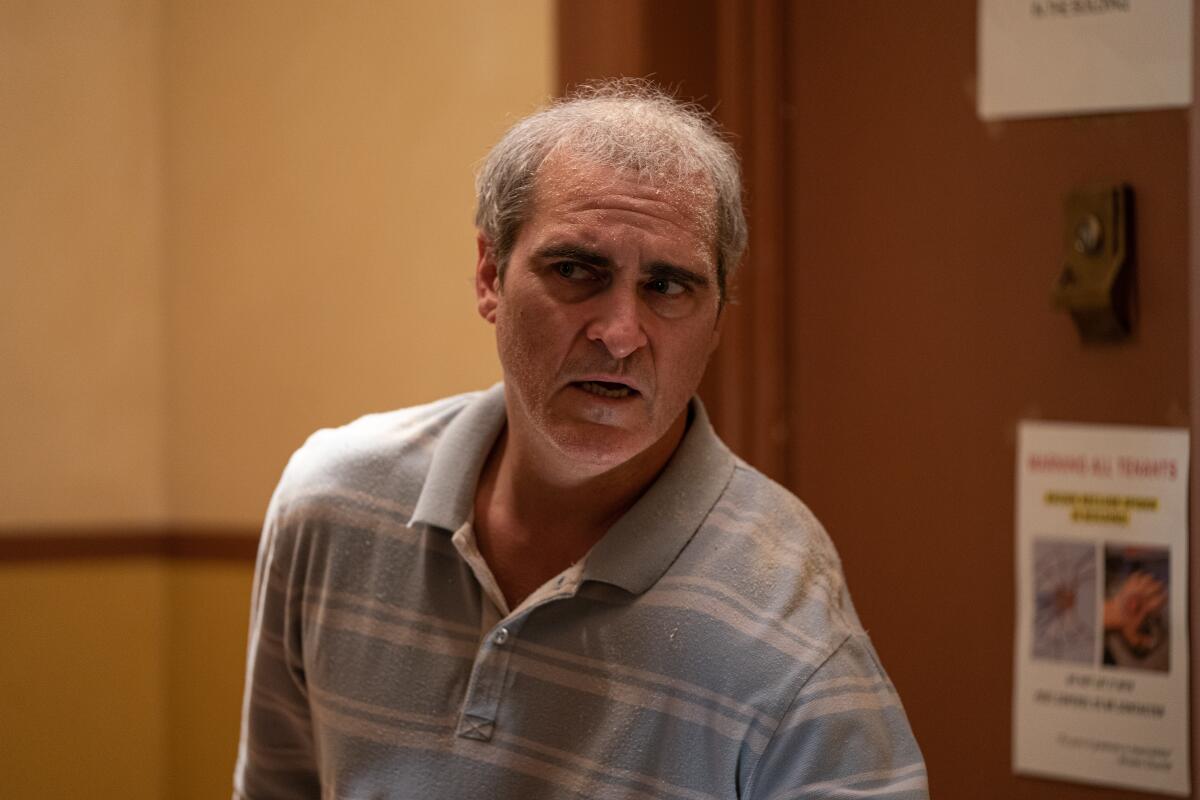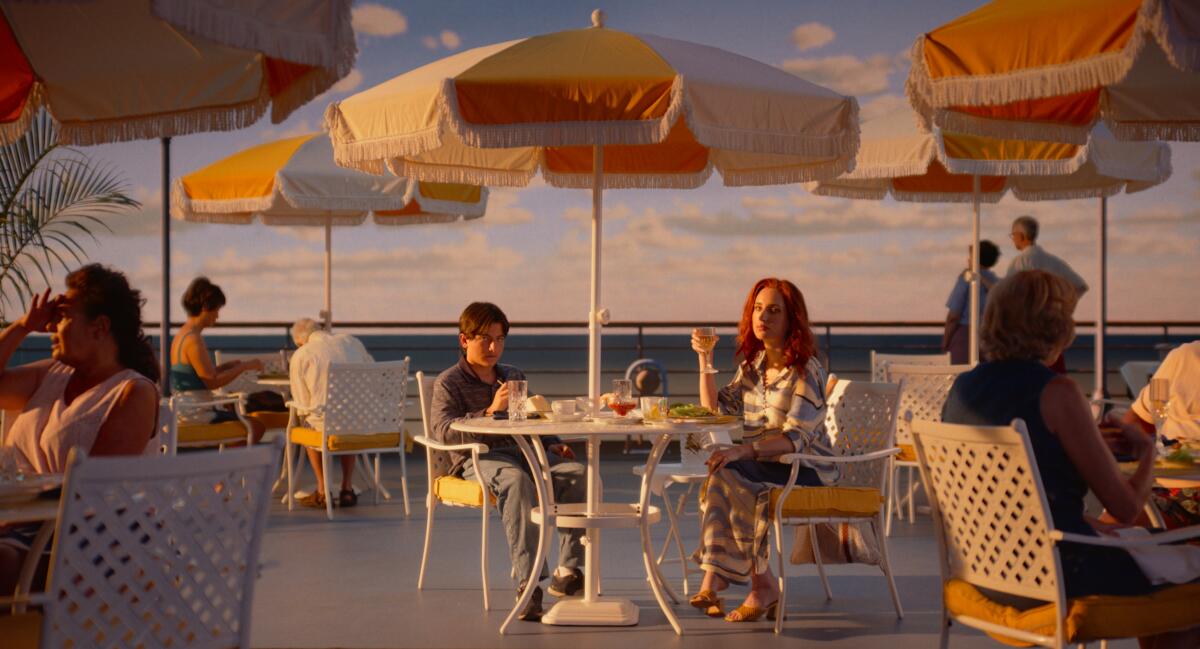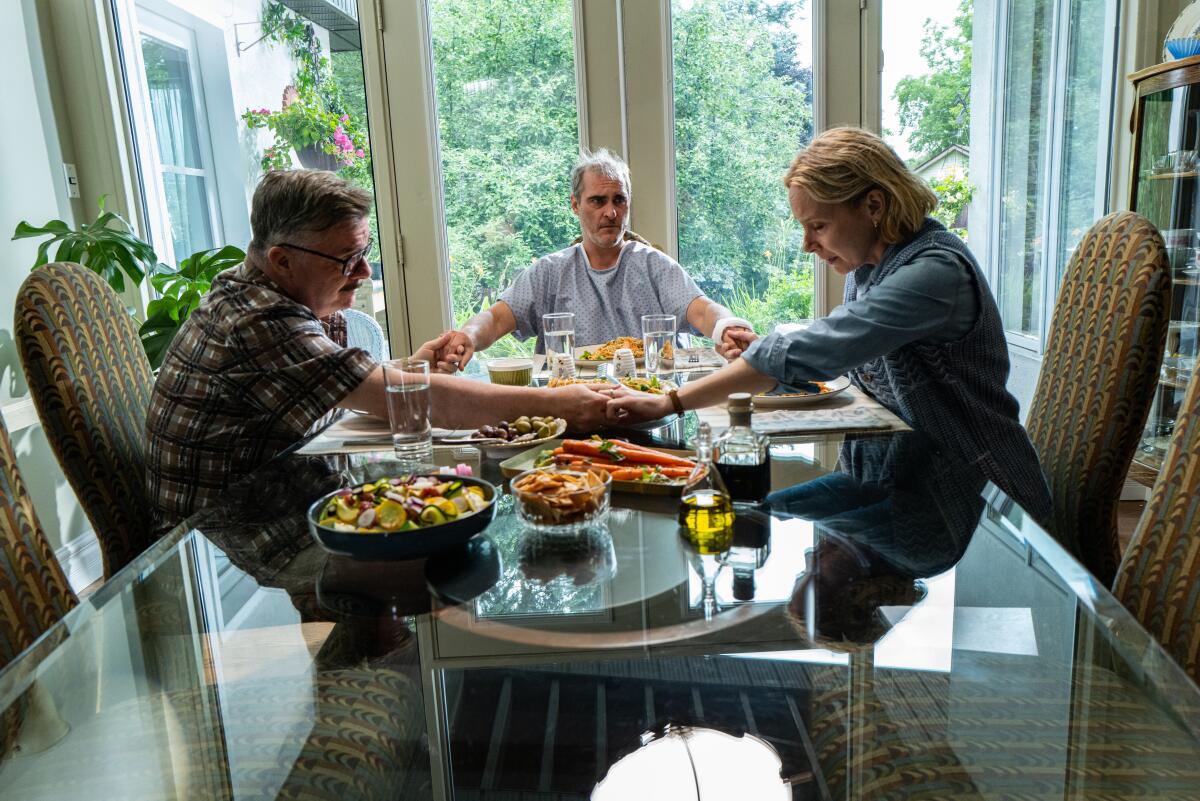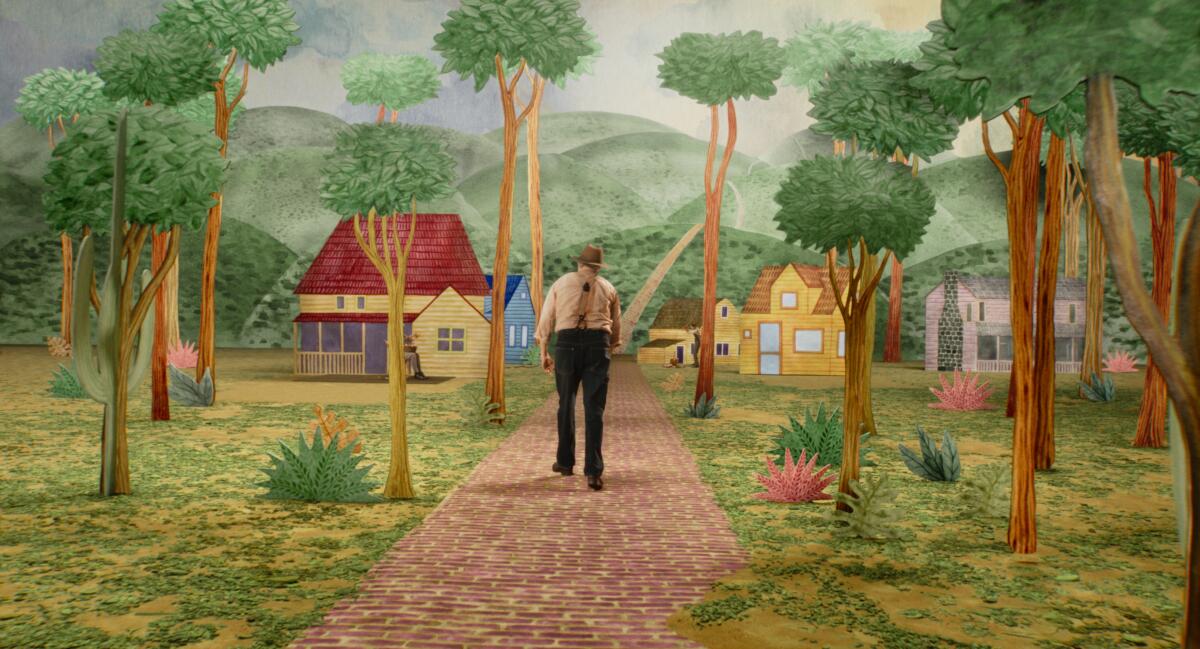
If you’ve just watched Ari Aster’s new horror-comedy “Beau Is Afraid,” you probably have a few questions. Or maybe a lot of questions. Like, what was that?
As with his previous films, 2018’s “Hereditary” and 2019’s “Midsommar,” Aster packs a lot into his surreal, alternately funny and nightmarish three-hour head trip through the mind of a middle-aged man named Beau (Joaquin Phoenix), whose attempt to return home to visit his mother turns into a hellish odyssey of anxiety, guilt and shame. But he would rather not do the unpacking for you. “I made something for an audience and I hope that it is exciting and fun and makes people feel things,” Aster said in a recent interview with the Associated Press. “I just cannot speak to what those things are, and shouldn’t.”
Aster’s full intentions with “Beau Is Afraid” are known only to him — and maybe his mother and therapist. But we have each seen the film twice in an effort to crack its code, and we have some thoughts. (Needless to say, major spoilers ahead.)
Toward a Unified Theory of ‘Beau’
Matt Brennan: As I watched “Beau Is Afraid” for the second time this week, armed with a notebook and our mission to “explain” Aster’s (guilt) trip to hell, I began to formulate something I couldn’t on the first watch, mesmerized/bored as I was with our protagonist’s meandering homeward journey: a unified theory of “Beau.” Well, two of them.
Theory 1: Mona Wasserman is behind it all (and not just faking her own death)
Beau’s mother (Patti LuPone), as chief executive and namesake of the ubiquitous MW Industries, certainly has the resources — and the marrow-deep bitterness — to pull off such a feat. MW, which appears to be a cross between Pfizer (pharmaceuticals) and Proctor & Gamble (personal care and hygiene), appears on billboards, posters, appliances, frozen food boxes and beyond. This is one powerful corporation, and one powerful woman. What Mona wants, Mona gets.
Indeed, she so convincingly fakes her own death that Beau finds published obituaries online, in addition to an “MW Digital”-watermarked news clip reporting on her fate. In just days, she has paid (or forced) a beloved employee to die on her behalf; installed a ledger stone in the wall and a memorial to the grisly chandelier accident that took her life; and arranged an opulent funeral for herself.
Two items, both from Beau’s brief survey of the MW Industries mini-museum Mona keeps in her home, would seem to support this theory. Most persuasive is the collage of MW employees that adds up to Mona’s face, which contains not only Elaine (Parker Posey) but also the tattooed bum who chases Beau into his building in the film’s first minutes and Roger (Nathan Lane), who takes Beau in after his unfortunate car accident/stabbing. (I have no doubt that, had I been able to get AMC to pause the film for me, I’d have seen others from the cast.) In other words, Mona has marshaled the manpower of MW Industries to create a sort of “Synecdoche, New York” or “Truman Show” situation for Beau, in which she casts him as the central figure in a brutal odyssey to test his loyalty.
This seems more plausible, practically speaking, when you consider that Beau, far from carving out an independent life in the city without support from his mother, lives in a recently opened MW Industries “rehabilitation neighborhood” depicted on a poster just behind Beau as he examines the collage. If she owns the set and employs the players, how hard would it be to script the drama? (Stray thought: Maybe Aster doesn’t have mommy issues, but studio exec issues.)
Theory 2: It’s all in Beau’s head
Being terminally literal, I was all in on Theory 1 until the kangaroo court that concludes the film, which up until that point hews mainly to real-world referents even as it turns their volume up to 15. I suppose it is just as plausible that Mona would have built an underground stadium in a rock outcropping in the middle of the ocean as it is that she would have directed the entire staff of a major multinational conglomerate to beat the s— out of her son. But the “proof” of Beau’s guilt presented at trial, though it assumes the visual style of surveillance footage, seems much more likely to have come out of Beau’s self-flagellation: a memory of hiding from his frantic mother, for instance, or allowing his friends to steal her underwear. These are exactly the kind of highly specific, relatively insignificant mental images from childhood that might cling to an anxious, guilt-ridden adult. Trust me, I’m Catholic.
Which is all to say that, as I cast my eye back over the film from perspective of the trial, I can just as easily see Beau imagining that his mother would have directed the entire staff of a major multinational conglomerate to beat the s— out of him, in ways both obvious and subliminal, as I can imagine her actually doing it.
Plus, there’s the penis monster. That can’t be real real, right? Right?
Did I forget to take my Zypnotycril with eight ounces of water this morning, Josh, or am I on to something? Which of my theories seems more likely to you, or do you have one of your own? And are there any particular parts of the film you want to dig into further?

Chronicle of an Ego-Death Foretold
Josh Rottenberg: Even after watching it twice, there are a few things in this movie — actually, more than a few — that I am still puzzling over. (What’s up with the guy who falls on Beau from the ceiling when he’s in the bath, for one?) But I actually think your two unified theories can be combined into a single Even-More-Unified Theory:
Theory 3: We are trapped in Beau’s head, and he in turn is trapped in his mother’s
Aster has suggested in interviews that his central aim with the film was to place the audience inside Beau’s mind and his feelings, so I don’t think we’re meant to take anything he sees and experiences too literally — and that includes the penis monster, which we can get to later.
As I see it, Beau’s journey is a psychological odyssey made up of fears, dreams, fantasies and repressed memories, none of which adhere to the usual rules of logic. Asking if Beau’s mother was really the unseen puppet master in her son’s life is sort of like asking if Gregor Samsa really turned into a giant bug in Franz Kafka’s “The Metamorphosis.” (Kafka is clearly a touchstone for Aster.) For Beau, the sense of being continually monitored, manipulated and controlled by his smothering mother, of having his life circumscribed by her worries, expectations and demands, carries a metaphorical and emotional truth, if not a literal one.
One thing I caught on my second viewing is that the ending of the movie is actually foreshadowed in a fleeting moment near the beginning: After Beau leaves his therapist’s office, as he’s walking through a less menacing part of the city than his own hellscape of a neighborhood, we briefly see a boy playing with a toy boat in a public fountain. As Beau passes by, the boy’s mother angrily grabs her son’s arm and tugs him away, causing the boat to capsize just like the one Beau will find himself on in the final scene. Beau’s fate is foretold in that one moment, and from that point on he has no hope of escaping it.

Brennan: I admit, after reading your much more concise theory, that I have probably taken “Beau Is Afraid” not only too literally but also too seriously. (I can only imagine what the other theater patrons thought of me scribbling furiously in my notebook during the movie on Monday night. What a freak!) And your note about the foreshadowing contained in the film’s first minutes is a useful segue into other indications we have of where Beau is headed and why we shouldn’t see his journey as a linear one.
At one point, for instance, he literally fast-forwards to the end of his story, captured on “Channel 78” in Grace (Amy Ryan) and Roger’s living room. We see Beau’s emergence from the woods after Jeeves’ (Denis Ménochet) attack on the theater troupe; Beau sitting on the ledge above his mother’s coffin; even, as Grace passes by the television, the empty coliseum of the closing credits, after Beau’s own boat has capsized. Each time Beau is knocked unconscious (which is a lot), we catch further glimpses of this unconscious logic, in which Beau appears to exist in multiple places and times simultaneously. After he’s hit by Grace and Roger’s truck, there’s a flash of the black, star-pricked sky he sees when he’s out on the ocean alone. After he smacks his head on the tree limb in the forest, we see his mother closing the attic door. After he’s zapped by Roger’s “health monitor,” we return to what Beau himself describes as a recurring “dream” about resisting his mother’s attempts to get him in the bathtub — while Beau also watches the scene from the bathtub.
At this point I feel as though I am just listing facts about the film hoping they’ll add up to something more than, “Wow, this guy’s mother did a worse number on him than Norma Bates.” Then again, if there is a point to “Beau Is Afraid,” I suppose it’s that parent-child relationships, particularly mother-son relationships, are so elemental, so Oedipal, that there can be no rational understanding thereof. (I mean, nothing more tellingly foreshadows Beau’s apparent drowning, with his mother’s distant cries for accompaniment, than his emergence into the world to Mona’s terrified screams.) The line from the film that has stuck with me most, after two viewings, is the one that makes this point most explicit: When Mona, closing the attic door on adult Beau, hisses after him, “Don’t you get it, you stupid idiot? That wasn’t a dream. That was a memory.”
Now that we’re in the attic and I’ve brought up Oedipus, we might as well get it over with: Let’s talk about the penis monster. (I had to watch the scene through my fingers both times. It’s beyond disgusting.) Put on your psychologist cap, Dr. Rottenberg, and tell me what you think the monster, and the film’s other psychosexual terrors, might mean. For example, what do you make of the (possibly apocryphal) tale that Beau’s father, and entire male line before him, died at the moment of their first ejaculation? And what does it mean that Beau survives it, but kills Elaine in the process?
Testicle and Taboo
Rottenberg: I’ll admit that, even after two go-rounds with this movie, I’m still not sure quite what to make of the penis monster, who I have come to think of as Jabba the Nuts. But, like the naked guy running around Beau’s neighborhood, I’ll take a stab.
Mona tells Beau that the hideous phallic creature in the attic is his father, but we clearly can’t trust everything she says. And that’s before we even begin to contemplate how exactly a 7-foot-tall penis with insect legs would have impregnated Mona to begin with. (Let’s not go there.)
My theory is that Beau’s real dad is the mystery man who approaches him after the play in the woods and tells him that he knew his father and that he is still alive. Beau, who has just experienced a fantasy father-son reunion within the dream world of the play, certainly believes he could be, calling out “Dad, run!” just before the man is blown up by Jeeves. And the man does bear some resemblance to the blurry photo of Beau’s father we catch a quick glimpse of earlier in his apartment.
In her desire to control every aspect of her child’s life, Mona has filled Beau with deep-seated fears about his own sexuality, stunting his development. The story she has told him about his father’s death serves to keep him an infantilized, dependent man-child. (There’s a reason this man who is in his late 40s dresses like an 8-year-old circa 1983 and has the social skills to match, particularly around the opposite sex.)
As Mona tells Beau when he’s young, “Only women know women. Men are blind.” And to ensure Beau remains blind and distanced from his real father — who may have helped him chart his own independent path toward manhood — she has concocted the fictitious story of the familial curse.
So who, or what, is Jabba the Nuts — and who is the bedraggled, starving man we see chained up with him? We’re pretty clearly in the realm of Freudian symbolism here (attic = unconscious), so I think the monster represents Beau’s repressed sexuality, a raging, insatiable id that, like his own distended testicles, has grown to cartoonish proportions. The man chained up with it, who is purportedly Beau’s lost brother, represents his more courageous and self-possessed self, which his mother has also metaphorically locked away.
When Beau has sex with Elaine — in his mother’s bed, no less! — and doesn’t die, he experiences a feeling of genuine liberation and, for an all-too-brief moment, becomes his own man. But, in a cruel twist, Elaine — who it turns out worked for Mona (and, like Martha, dies for her) — keels over instead, suggesting Beau can never elude the real curse his mother has placed on him: Like the Mariah Carey song says, he will always be her baby.
As Mona tells Beau moments after Elaine’s death, “You’re in my house, and my house is your house, which it always will be.” Again, in a movie where locks, keys, chains and surveillance technology are recurring motifs, there is ultimately no escape.
By the way, a couple more Easter (or Aster) eggs I caught on a second viewing: The first time we see Beau in the film (aside from as a newborn), he is in his therapist’s office, looking at a fish tank. At the end of the film, after he chokes his mother, she falls headfirst into an empty fish tank, bringing things full circle.
Also, as we see on the therapist’s prescription pad, Beau lives in the fictional city of Corrina, CR. There’s a Bob Dylan song called “Corrina, Corrina” on his 1963 album “The Freewheelin’ Bob Dylan,” which includes the pleading refrain, “I been worryin’ about you, baby / Baby, please come home” — a sentiment straight out of Mona’s anxious, needy heart.
Fear and Loathing in Asterville
Brennan: Your mention of Dylan brings us to terrain I’m better equipped to handle than a case of epididymitis run amok: The film’s phantasmagoric dogpile of cinematic, cultural and political points of reference. As your reading of Beau’s relationship with Mona suggests, “Beau Is Afraid” hews rather closely to the subgenre of horror movies (see: “Psycho,” “Carrie,” “Dead Alive,” “Black Swan,” Aster’s own “Hereditary”) about domineering mothers and traumatized children, even if its tone is more satirical than chilling. Where “Beau” distinguishes itself, for me, is in the provocations of its situations and settings that have nothing to do with the Wassermanns per se.
For starters, there’s the city where Beau lives, an exaggerated cross between the seedy, teeming New York of “Taxi Driver” and the crime-infested urban cores imagined on Fox News, populated primarily by assailants, corpses and beggars. Graffiti covers every inch of the foyer of Beau’s building; vagrants shuffle along like the undead in a zombie film; trash piles up on street corners and abandoned cars along curbs.
At first, I felt uncomfortable about Beau’s paranoia. It struck me as infelicitous at best that Aster’s “hero” should be “subjected” to the very sort of inner-city crime fantasy that so often misrepresents urban life in American pop culture. The more I chew on it, though, the more I see Aster’s vision as a critique of that paranoia, and of attempts to address social inequality through policing and “private-sector solutions.” (Possibly the most darkly funny line in a film full of gallows humor is the police officer, gun cocked, shouting at an unarmed Beau not to “make” him shoot.) Indeed, beyond the corner that MW Industries has attempted to “rehabilitate,” the city seems … almost normal? The pedestrian mall where Beau purchases that white statuette of Madonna and child is certainly thriving!
Even the dangers of Beau’s immediate vicinity come in and out of focus as his own mental state evolves. When he turns in for bed the night before his flight to Wasserton — before his anxiety gets the better of him — the ambient noise is the light murmur of any city just before midnight. When Mona chastises him for his delay, however, the street outside erupts in midafternoon gunfire, sirens and barking dogs. To believe that the city is a miserable death trap for all its inhabitants, Aster suggests, is to think like Beau (a coward with no sense of self) or, worse, his mother (a rapacious capitalist merely envisioning violent cities from her palatial enclave).
“Beau Is Afraid” flips the idea on its head, and pushes it to the extreme, during Beau’s recuperation at Grace and Roger’s house — the section of the film that grew on me most from first to second viewing. The notion of the suburbs as the American dream’s dark underbelly isn’t exactly new, but Aster’s heart-poundingly, head-trippingly, paint-drinkingly intense iteration of the trope is a thrilling one. Amy Ryan popping pills to stanch a mother’s grief? Nathan Lane talking like an outdated sitcom dad to win Beau’s trust? Their screaming, foul-mouthed daughter, Toni (Kylie Rogers)? Their deceased son’s catatonic ex-soldier-slash-illing machine friend? Douglas Sirk, eat your heart out!
I read this section of the film, in which the physical security Beau (briefly) enjoys comes with the blossoming of a much deeper existential dread, as the one where Aster comes closest to identifying societal causes for Beau’s fears, and indeed Mona’s. After all, it’s in the suburbs of “Beau Is Afraid” — a place of self-medication and post-traumatic stress disorder, suicide and surveillance, war and its aftermath — that the world of the film edges up to our own. Who wouldn’t read that list of symptoms and diagnose a society in distress?
Whether the crisis of modernity has made Beaus and Monas of us all is something you can respond to or not, Josh. This movie has worn me and my powers of analysis down to the nub. Before I raise the white flag, though, I’d be remiss if we didn’t talk a little more directly about my favorite passage in the movie: the play in the woods. It is the best of “Beau” in microcosm, bawdily funny, visually inventive, with a vein of genuine feeling running through it. Its resonances with Beau’s experiences in the rest of the film are omnipresent but rarely exact. And, perhaps most important of all, its Matryoshka doll of stories at least nod to a place, a time, an alternate universe where Beau’s fate could have been different. Where he could have been unafraid.

Rottenberg: I agree that the play in the woods is in some ways the key to understanding the whole movie and its emotional high point. As he enters the theater troupe’s camp, Beau passes a sign that reads “Know Thyself.” And in watching — or, rather, imagining — the alternate life he could have lived if only he wasn’t chained to his mother, he experiences a genuine moment of insight and catharsis. In the play’s climax, as he hugs the three sons he will never have, Beau — who came into the world as an infant to the sound of Mona screaming, “Why isn’t he crying?” — finally unburdens himself and sheds real tears.
In the gentle pregnant woman who takes him in, Beau — having been cast out as “a demon” by his surrogate mother, Grace — sees the idealized, selfless maternal figure he has been seeking all his life. Overwhelmed with gratitude for her kindness, he gives her the mother-and-child figurine he has been carrying, which he intended to give to Mona — the ultimate betrayal, for which he will be punished in the film’s final moments.
There are still a whole lot of questions we could tackle here, Matt: Why does Beau live in a run-down apartment when his mother is a wealthy titan of industry? What are the “three things” in the joint Toni makes Beau smoke? How does Jeeves survive to kill the penis monster after we see him blast himself through the chest with a machine gun? But like you, I’m feeling analytically depleted.
And if any reader feels like we went on too long or our theories missed the mark, as Beau says countless times in the movie, I’m sorry.
Brennan: I will happily stand trial over any interpretive crimes I’ve committed here. But only if I get to have Richard Kind as my lawyer.